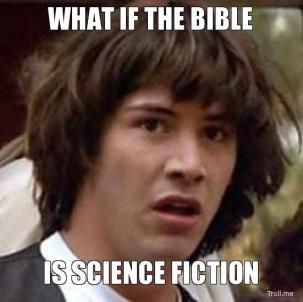
The Compilation of the Bible
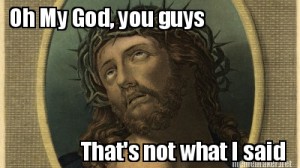 The men who compiled the New Testament canon wrote volumes attacking their opposition and arguing with their critics, so would have recorded basic facts to bolster the credibility of their books if they had them. They did not. There are no such facts about an historical Jesus in their own writings.
The men who compiled the New Testament canon wrote volumes attacking their opposition and arguing with their critics, so would have recorded basic facts to bolster the credibility of their books if they had them. They did not. There are no such facts about an historical Jesus in their own writings.
The criteria used choosing the canon were unscholarly and never strictly applied. There was much argument and confusion about what was and was not the word of God, and it took 350 years after Jesus’ death for a definitive decree to be decided.
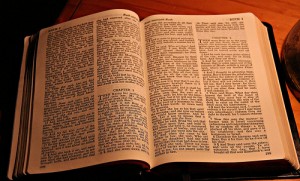 Nowhere in the New Testament is there a legitimate explanation, backed up by facts, which would convince an objective historian of the authenticity of any of the accounts about Jesus. Outside the Bible, some church fathers, bishops, and academics pass commentary that has survived, yet it all was written 100 plus years after Jesus’ death, is very sparse, piecemeal and always raises more questions than it answers. After the Gospels appeared, writers presumed a parallel between them and Jesus, but were unable to prove it.
Nowhere in the New Testament is there a legitimate explanation, backed up by facts, which would convince an objective historian of the authenticity of any of the accounts about Jesus. Outside the Bible, some church fathers, bishops, and academics pass commentary that has survived, yet it all was written 100 plus years after Jesus’ death, is very sparse, piecemeal and always raises more questions than it answers. After the Gospels appeared, writers presumed a parallel between them and Jesus, but were unable to prove it.
The key case for the selection of scripts for inclusion in the canon was that they were already popular in particular parishes. This standard is obviously flawed: firstly, popularity often has little to do with historical truth. Lord of the Rings and Harry Potter are popular books, but no one thinks they are truthful accounts of history just because they are well liked. Secondly, it ignored the accounts of any Christians who were not card carriers in conformist churches. The Gnostics and numerous other Christian groups had no less legitimate beliefs, yet most of their writings were labeled as heretical.
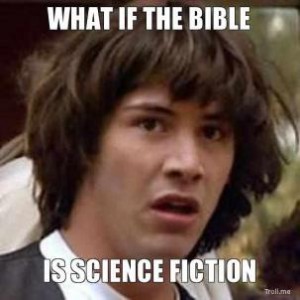 There are falsely signed letters throughout the Bible; nowhere in the writings of antiquity are the true identities of so many authors so hidden from the reader. Some of Paul’s epistles are the only works for which we know the real identity of the author, and even then his writings have been interfered with. Perhaps the Church Fathers did not record who the author was, because that would have exposed the writings’ lack of credibility. Anonymous authors meant specific answers did not have to be given to difficult questions. Faith was easier to promote than facts.
There are falsely signed letters throughout the Bible; nowhere in the writings of antiquity are the true identities of so many authors so hidden from the reader. Some of Paul’s epistles are the only works for which we know the real identity of the author, and even then his writings have been interfered with. Perhaps the Church Fathers did not record who the author was, because that would have exposed the writings’ lack of credibility. Anonymous authors meant specific answers did not have to be given to difficult questions. Faith was easier to promote than facts.
Catholics were punctilious about crossing out competition to their authority. They took what they thought was useful from the Gnostics and Marcionites and then destroyed nearly all their writings. To destroy literature one does not like is not the conduct of people interested in the truth, but the behavior of narrow-minded empire building bigots.
The Church Fathers were Charlatans!
“A little jargon is all that is necessary to impose on the people. The less they comprehend, the more they admire. Our forefathers and doctors have often said not what they thought, but what circumstances and necessity dictated.”
St. Gregory (mid fourth century, from Jerome’s letter 52 to Nepotian, http://catholicism.org/gregory-great.html)
“It will not appear strange to those who have given any attention to the history of mankind, which will always suggest this sad reflection: That the greatest zealots in religion, or the leaders of sects and parties, whatever purity or principles they pretend to have seldom scrupled to make use of a commodious lie for the advancement of what they call the truth. And with regard to these very Fathers, there is not one of them…who made any scruple in those ages of using the hyperbolical style to advance the honor of God and the salvation of men.”
(Dr. Conyers Middleton, 1844.)
Were the church fathers reputable scholars? Honest historians? We can examine their writings to find the answers.
 Papias was one of the very earliest “fathers.” He may (if Eusebius can be believed) have claimed to have known someone who had known the author of Mark’s Gospel, yet gave no details of who they were. Surely he would have documented something so important if he knew of it.
Papias was one of the very earliest “fathers.” He may (if Eusebius can be believed) have claimed to have known someone who had known the author of Mark’s Gospel, yet gave no details of who they were. Surely he would have documented something so important if he knew of it.
Unfortunately for Papias’ reputation, Eusebius expressed serious reservations about the caliber of his intellect:
“I guess he got these ideas from a misinterpretation of the apostolic accounts. For he did not understand what they said mystically and in figurative language. For he obviously was a man of very little intelligence, as one can tell judging from his sayings. Nevertheless, it was due to him that so many churchmen after him adopted a similar opinion, basing their position on the fact that he was a man of the earliest era” (Eccles. Hist. 3.39.12–13.) Eusebius had to guess where Papias got his facts from, wrote him off as stupid, and then admitted he was a significant and early source of Christian dogma!
Papias wrote that Jesus said:
“The days shall come, in which there shall be vines, which shall severally have ten thousand branches; and every one of these branches shall have ten thousand lesser branches; and every one of these branches shall have ten thousand twigs; and every one of these twigs shall have ten thousand clusters of grapes; and everyone of these grapes being pressed shall yield two hundred and seventy-five gallons of wine. And when a man shall take hold of any of these sacred bunches, another bunch shall cry out ‘I am a better bunch, take me, and bless the Lord by me!’” (Irenaeus, Adv. Hær., v. 33, 3.)
He was willing to concoct anecdotes and obviously was not a reliable historian.
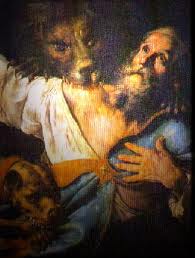 Ignatius of Antioch tells us of the “star of Bethlehem:”
Ignatius of Antioch tells us of the “star of Bethlehem:”
“A star shone forth in heaven above all other stars, and the light of which was inexpressible, while its novelty struck men with astonishment. And all the rest of the stars, with the sun and moon, formed a chorus to this star” (to the Ephesians chapter XIX.) He may have been writing metaphorically, yet to claim something this comical is childish.
He praised ignorance as a virtue:
“It is therefore better and more profitable to belong to the simple and unlettered class, and by means of love to attain to nearness to God, than, by imagining ourselves learned and skilful” (Against Heresies, Book II, Chapter 26.) He had little respect for human intellect or integrity.
Justin Martyr was unscrupulous. He interpolated the Septuagint with a number of phony prophecies concerning Jesus which were weak, clumsy, and dishonest. They can be found in the dialogue of Justin with Trypho the Jew (http://www.earlychristianwritings.com/text/justinmartyr-dialoguetrypho.html).
Justin justified his belief in Jesus as follows:
“When we say also that the Word, which is the first birth of God, was produced without sexual union, and that he, Jesus Christ, our teacher, was crucified, died, and rose again, and ascended into heaven, we propound nothing different from what you believe regarding those whom you esteem sons of Jupiter” (First Apology, chapter 21.) Instead of discussing evidence, he said (quite correctly) that the Jesus account was very similar to myths about other gods, and should therefore be equally true. Jesus had died only one hundred years earlier.
He claimed that Socrates (469–399 BCE) and Heraclitus (535–475 BCE) were Christians (First Apology Chapter 46, Second Apology Chapter 10,) a statement similar to saying that Galileo was a Mormon.
He believed insane people were possessed by the souls of the wicked, so were proof of the immortality of souls. (First Apology, Chapter 18.)
“Before replying to Celsus, it is necessary to admit that in the matter of history, however true it might be, it is often very difficult and sometimes quite impossible to establish its truth by evidence which shall be considered sufficient” (Contra Celsum 1.58.) This was a plain admission that many of the claims in the New Testament could not be historically verified. At least he was candid enough to admit he often called beliefs true only because he wanted them to be true. And
“As this matter of faith…we accept it as useful for the multitude, and that we admittedly teach those who cannot abandon everything and pursue a study of rational argument to believe without thinking out their arguments.” (Contra Celsum 1.10.) He admitted that “we” turned to faith as a tool to convince a gullible crowd. “We” were his fellow bishops, the men who promoted Christian dogma.
He thought the sun, moon, and stars were living creatures, with a free will, that sometimes sinned. One might forgive him for having no understanding of astronomy, but not for imagining that celestial objects had minds of their own. He clung to the pagan superstition that comets and new stars portend great world events, and thought that this undoubted fact gave credibility to the story of the star of Bethlehem:
“It has been observed that, on the occurrence of great events, and of mighty changes in terrestrial things, such stars are wont to appear, indicating either the removal of dynasties or the breaking out of wars, or the happening of such circumstances as may cause commotions upon the earth, why not then the Star of Bethlehem?” (Contra Celsum, chapter 1.)
 Tertullian was a commodious liar. He asserted,
Tertullian was a commodious liar. He asserted,
“I know it that the corpse of a dead Christian, at the first breath of the prayer made by the priest, on occasion of its own funeral, removed its hands from its sides, into the usual posture of a supplicant; and when the service was ended, restored them again to their former situation.” (De anima, chapter 51.)
He denounced the sin of going to the theatre:
“We have the case of the woman—the Lord Himself is witness—who went to the theater, and came back possessed. In the outcasting (exorcism), accordingly, when the unclean creature was upbraided with having dared to attack a believer, he firmly replied: ‘And in truth I did most righteously, for I found her in my domain” (De Spectaulis.)
Tertullian believed the hyena could change its sex every year (De Pallio, Chapter 3), eclipses and comets were signs of god’s anger (To scapula, Chapter 3,) and volcanoes were openings into hell (De Penitentia, Chapter 12.)
He advised Christians not to think critically, but to take the path of blind faith. To him, all kinds of rational thinking became superfluous compared to the gospels:
“For philosophy is the material of the world’s wisdom, the rash interpreter of the nature and dispensation of God. Indeed heresies are themselves instigated by philosophy… What indeed has Athens to do with Jerusalem? What has the Academy to do with the Church? What have heretics to do with Christians? Our instruction comes from the porch of Solomon, who had himself taught that the Lord should be sought in simplicity of heart. Away with all attempts to produce a Stoic, Platonic, and dialectic Christianity! We want no curious disputation after possessing Christ Jesus, no inquisition after receiving the gospel! When we believe, we desire no further belief. For this is our first article of faith, that there is nothing which we ought to believe besides.” (De Praescriptione, Chapter vii.)
He claimed, without evidence, that Pilate converted to Christianity:
“All these things Pilate did to Christ; and now in fact a Christian in his own convictions, he sent word of Him to the reigning Caesar, who was at the time Tiberius” (The Apology, Chapter 21.)
He was so deluded he might have called black white:
“The Son of God was crucified; I am not ashamed because men must needs be ashamed of it. And the Son of God died; it is by all means to be believed because it is absurd. And He was buried, and rose again; the fact is certain, because it is impossible. But how will all this be true in Him, if He was not Himself true–if He really had not in Himself that which might be crucified, might die, might be buried, and might rise again?” (The Ante-Nicene Fathers, Vol: III: Latin Christianity: Its Founder, Tertullian, 525.)
He obviously preferred faith to reason, and disliked complexity. In the same work he called Aristotle “wretched” and disparaged the tentative investigative nature of Greek science as
“self-stultifying…ever handling questions but never settling them.” This attitude was the antithesis of rational thought. Compare this to what Celsus wrote:
“For why is it an evil to have been educated, and to have studied the best opinions, and to have both the reality and appearance of wisdom? What hindrance does this offer to the knowledge of God? Why should it not rather be an assistance, and a means by which one might be better able to arrive at the truth?” (Excerpts from Contra Celsus by Origen, book 3 Chapter 59.)
Celsus, a contemporary, clearly realized the early Christian’s reasoning was irrational.
Tertullian lacked common sense, was a lazy thinker, justified his own ignorance using religion, and thought he could invent facts to advertise an agenda.
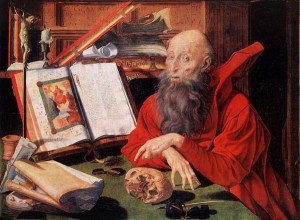 Jerome was an impressive scholar, yet he admitted to employing verbal babble to beguile the hoi polloi:
Jerome was an impressive scholar, yet he admitted to employing verbal babble to beguile the hoi polloi:
“There is nothing so easy as by sheer volubility to deceive a common crowd or an uneducated congregation.” (Epistle to Nepotian, lii, 8.)
He claimed:
“It is usual for the sacred historian to conform himself to the generally accepted opinion of the masses in his time” (P.L., XXVI, 98; XXIV, 855.) In other words, the historian need not rely on facts, but rather on common opinion.
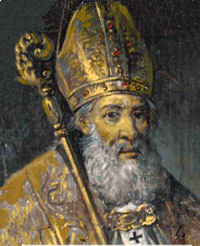 Eusebius is notorious as the author of numerous falsehoods. He probably created the “Testimonium Flavianum,” a passage in the writing of Josephus that refers to Christ, and forged a letter in Jesus’ name. He admitted on at least two occasions that he was less than honest:
Eusebius is notorious as the author of numerous falsehoods. He probably created the “Testimonium Flavianum,” a passage in the writing of Josephus that refers to Christ, and forged a letter in Jesus’ name. He admitted on at least two occasions that he was less than honest:
“We shall introduce into this history in general only those events which may be useful first to ourselves and afterwards to posterity” (Ecclesiastical History, Vol. 8, Chapter 2.)
“How it may be Lawful and Fitting to use Falsehood as a Medicine, and for the Benefit of those who Want to be Deceived.” (Ecclesiastical History, Vol. 8, chap. 2.) So much for integrity and objectivity from Christianity’s most important historian!
He wrote of a man who was tortured until his body
“was one continued wound, mangled and shriveled, that had entirely lost the form of man” and then “recovered the former shape and habit of his limbs” (Ecclesiastical History, book V, Chapter 2.) These are the words of a man using falsehood as a medicine.
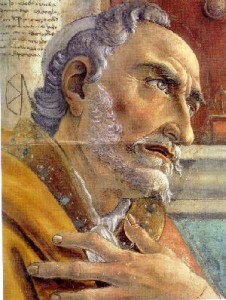 The Catholic Encyclopedia claims Augustine was
The Catholic Encyclopedia claims Augustine was
“a philosophical and theological genius of the first order, dominating, like a pyramid, antiquity and the succeeding ages. Compared with the great philosophers of past centuries and modern times, he is the equal of them all; among theologians he is undeniably the first, and such has been his influence that none of the Fathers, Scholastics, or Reformers has surpassed it.” High praise indeed! It almost sounds as if they are apologising for other church theologians.
Interestingly, the author is conceding there is not a single theologian other than Augustine whose intellect can compare with great philosophers past and present. It is odd that he thinks so little of other theologians. Perhaps the wording will be changed in future editions. It is also surprising that Augustine is considered a greater theologian than Paul, as it was Paul who more or less invented Christian theology.
It can be argued that Augustine was not a philosopher of the highest caliber for the following reasons.
He was adamant the earth was no more than six thousand years old:
“They are deceived, too, by those highly mendacious documents which profess to give the history of many thousand years, though reckoning by the sacred writings, we find that not yet 6,000 years have passed…” (City of God, Bk. xii, Chapter 10.)
Science has proven the great philosopher’s “sacred writings” wrong. He was writing in the fourth century, and could not have known any better, but he was bone-headed about it and sneered at anyone who didn’t believe the creation story:
“For as it is not yet 6,000 years since the first man, who is called Adam, are not those to be ridiculed rather than refuted who try to persuade us of anything regarding a space of time so different from, so contrary to, the ascertained truth?” (City of God, Bk xviii, Chapter 40.) His “ascertained truth” was the Old Testament, which was wrong about the age of the earth by a factor of close to a million!
Although many Greek philosophers from Pythagorus onwards had held that the earth was round, and Augustine had heard the theory, he was adamant it was flat and inhabited on the upper side only:
“As to the fable that there are Antipodes, that is to say, men who are on the opposite side of the earth, where the sun rises when it sets to us, men who walk with their feet opposite ours, is on no ground credible.” (City of God, Chapter xvi).
This “towering figure of early Christianity,” claimed:
“I was already Bishop of Hippo, when I went into Ethiopia with some servants of Christ there to preach the Gospel. In this country we saw many men and women without heads, who had two great eyes in their breasts; and in countries still more southly, we saw people who had but one eye in their foreheads.” (Sermones, xxxiii)
Augustine devoted two whole treatises to the topic of lying. The first of these, ‘De mendacio’ (‘On Lying’), written in 395, discussed the pros and cons of lying. Of the eight kinds of lie which he identified (each with several sub-types) he excused ‘jocular’ lies, was ‘uncertain’ about others (depending on motive and the likelihood of being believed,) and questioned the morality of the remainder. The second, ‘Contra mendacium’, written in 422 CE, cautioned the brethren as follows.
“One never errs more safely, methinks, than when one errs by too much loving the truth, and too much rejecting of falsehood.” (St Augustine, Retractations, Book I.) He had evidently thought long and hard before gracing his readers with this conclusion.
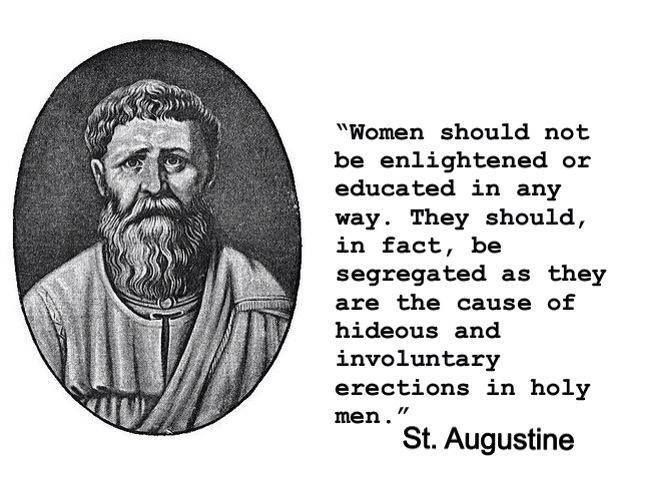 The great doctor invented his own biological facts:
The great doctor invented his own biological facts:
“Frogs are produced from the earth, not propagated by male and female parents” (City of God, Chapter xvi); and “There are in Cappadocia mares which are impregnated by the wind, and their foals live only three years.” (City of God, Chapter xxi.)
This number one theologian attempted to explain how people could survive fire in hell without being consumed, and wrote two chapters in City of God, on the topic, the first entitled
“Whether it is Possible for Bodies to last Forever in Burning Fire,” and the second
“Examples from Nature Proving That Bodies May Remain Unconsumed and Alive in Fire.”
He accepted as historic truth the mythical founding of Rome by Romulus and Remus and their birth to a virgin, fathered by the god Mars (an interesting idea for a Christian father,) and their nursing by the she-wolf, but attributed this to the interference of Yahweh.
This highly influential intellect thought demons caused disease:
“All diseases of Christians are to be ascribed to these demons; chiefly do they torment fresh-baptized Christians, yea, even the guiltless new-born infant” (De Divinatione Daemonorum, Chapter 3.) I know some superstitious Christians today who still attribute illnesses to demons.
The great interpreter of scripture accepted the fable of the miraculous translation of the Septuagint, (six-hundred-odd years before his time:)
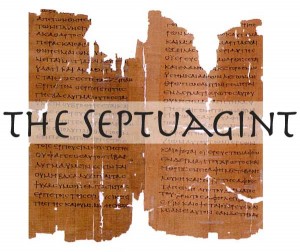 “It is reported that there was an agreement in their words so wonderful, stupendous, and plainly divine, each one apart (for so it pleased Ptolemy to test their fidelity), they differed from each other in no word, or in the order of the words; but, as if the translators had been one, so what all had translated was one, because in very deed the one Spirit had been in them all. And they received so wonderful a gift of God, in order that these scriptures might be commended not as human but divine, for the benefit of the nations. Who should at some time believe, as we now see them doing. If anything is in the Hebrew copies and not in the version of the Seventy, the Spirit of God did not choose to say it through them, but only through the prophets. But whatever is in the Septuagint and not in the Hebrew copies, the same Spirit chose rather to say it through the latter, thus showing that both were prophets.” (The City of God, xviii, 42, 43; pp. 385–387.) In reality the Septuagint translation was notoriously unreliable, a fact any Hebrew scholar can confirm today. Augustine invented history to justify the traditional text.
“It is reported that there was an agreement in their words so wonderful, stupendous, and plainly divine, each one apart (for so it pleased Ptolemy to test their fidelity), they differed from each other in no word, or in the order of the words; but, as if the translators had been one, so what all had translated was one, because in very deed the one Spirit had been in them all. And they received so wonderful a gift of God, in order that these scriptures might be commended not as human but divine, for the benefit of the nations. Who should at some time believe, as we now see them doing. If anything is in the Hebrew copies and not in the version of the Seventy, the Spirit of God did not choose to say it through them, but only through the prophets. But whatever is in the Septuagint and not in the Hebrew copies, the same Spirit chose rather to say it through the latter, thus showing that both were prophets.” (The City of God, xviii, 42, 43; pp. 385–387.) In reality the Septuagint translation was notoriously unreliable, a fact any Hebrew scholar can confirm today. Augustine invented history to justify the traditional text.
This great pyramid of learning pondered over
“whether angels, inasmuch as they are spirits, could have bodily intercourse with women?” (The City of God, Book XV, Chapter 23.) After much deliberation over an entirely imaginary subject, he concluded that they can and do, and that he had proof:
“Many proven instances, that Sylvans and Fauns, who are commonly called ‘Incubi,’ had often made wicked assaults upon women, and satisfied their lusts upon them: and that certain devils, called Duses by the Gauls, are constantly attempting and effecting this impurity.” (City of God, Chapter xv.)
This “philosophical genius” thought Christianity pre-dated Christ.
“What we now call the Christian religion existed among the ancients, and was from the beginning of the human race, until Christ Himself came in the flesh; from which time the already existing true religion began to be styled Christian.” (Retractions, I, xiii, 3.)
“I would not believe in the Gospel myself if the authority of the Catholic Church did not influence me to do so.” (Against the letter of Mani 5,6.) The Catholic Church’s number one theologian thought the gospel of Jesus was not inherently believable, but that the church knew better and was more authoritative than himself. Today’s church claims Augustine was their number one authority. Does anyone sense a circular argument?
He too derided the value of critical thought.
“There is another form of temptation, even more fraught with danger. This is the disease of curiosity…It is this which drives us to try and discover the secrets of nature, those secrets which are beyond our understanding, which can avail us nothing and which man should not wish to learn.” (Confessions) This comment promotes what is, in fact, the antithesis of good philosophy.
Augustine was a reasonably intelligent man, although his great rival Pelagius was far more sensible. His teachings on original sin, women and sex were despicable. He claimed to be an authority on history and scientific subjects he knew very little about, and invented facts to fill in the gaps. He wasn’t honest enough to admit the deficiencies of his religion.
 The men discussed here were the more educated members of the early Christian churches. Yet they were narrow-minded, superstitious, and mendacious. They readily told absurd, fabricated stories to impress simple people. Some of them forged documents. They displayed very little critical faculty; no story was too silly, no falsehood too glaring, no argument too weak to prevent them teaching it with full confidence of its truth. They thought it was permissible, and even commendable, to assert falsehoods for the sake of selling faith. They were the tabloid journalists of their day. It is on their testimony and others of their ilk that today’s Christian assumes the Gospels are truthful.
The men discussed here were the more educated members of the early Christian churches. Yet they were narrow-minded, superstitious, and mendacious. They readily told absurd, fabricated stories to impress simple people. Some of them forged documents. They displayed very little critical faculty; no story was too silly, no falsehood too glaring, no argument too weak to prevent them teaching it with full confidence of its truth. They thought it was permissible, and even commendable, to assert falsehoods for the sake of selling faith. They were the tabloid journalists of their day. It is on their testimony and others of their ilk that today’s Christian assumes the Gospels are truthful.
These characters, and countless others just like them, created, edited and interpolated the New Testament. Some altered quotations from the Septuagint to create phony prophecies concerning Jesus. Someone added a resurrection story to the Gospel of Mark. Someone attributed the authorship of the Gospels to the apostles of Jesus. Someone inserted into Matthew’s Gospel that Jesus wanted to start a new church with Peter at its head. Someone inserted Jesus’ name into Paul’s writings. Someone wrote literature in Paul’s name. Someone wrote Acts to try to link Jesus with Paul’s theology. Some incorporated traditions from other cults into the new one. There are countless other examples of their dishonesty. There was a corrupt culture in the early Christian church.
There are no excuses for this. Blatant fiction presented as truth, uncritical scholarship, and demands for blind faith are unacceptable in any age.
There were men of their era and before them, such as Plato, Aristotle, Celsus, Cicero, Philo, Seutonius, Tacitus and numerous others, who employed high standards of scholarship in their essays. Their compositions are believable, consistent and still read well today, whereas these writings don’t. None of these men were honest enough to publicly admit what their peers repeatedly pointed out; their faith was based on a foundation of manufactured mythical nonsense. Celsus wrote
“It is clear to me that the writings of the Christians are a lie, and that your fables are not well-enough constructed to conceal this monstrous fiction: I have even heard that some of your interpreters, as if they had just come out of a tavern, are onto the inconsistencies and, pen in hand, alter the originals writings, three, four and several more times over in order to be able to deny the contradictions in the face of criticism.”
(Celsus 178 CE, http://en.wikipedia.org/wiki/Celsus)
It is apparent how the Jesus Christ account emerged: Paul, Church Fathers and other nameless men concocted the stories in the same way they created untruthful anecdotes about demons, angels, animals, monsters, and singing planets. How could anyone today be convinced of the divinity, the miracles, or the teachings of Jesus after considering what these characters had to contend?
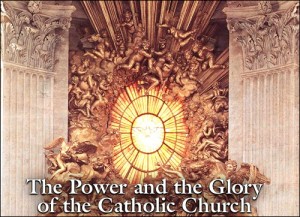 They concocted lies and denigrated honest commentators such as Celsus and the Gnostics. Promoting Christian dogma fortified their own power and status, and that of the institutions they represented.
They concocted lies and denigrated honest commentators such as Celsus and the Gnostics. Promoting Christian dogma fortified their own power and status, and that of the institutions they represented.
Consider Ignatius. He repetitively emphasized the importance of bishops so as to bolster the power of his church and counter all opponents. In his letter to the Ephesians he wrote:
“Wherefore it is fitting that ye should run together in accordance with the will of your bishop, which thing also ye do. For your justly renowned presbytery, worthy of God, is fitted as exactly to the bishop as the strings are to the harp. Therefore in your concord and harmonious love, Jesus Christ is sung.” In his letter to the Trallians he paralleled the position of bishop with the position of Christ:
“For, since you are subject to the bishop as to Jesus Christ, you appear to me to live not after the manner of men, but according to Jesus Christ, who died for us, in order, by believing in His death, you may escape from death. It is therefore necessary that, as you indeed do, so without the bishop you should do nothing” (http://www.newadvent.org/fathers/0106.htm), and
“…Let us be careful not to resist the Bishop, that through our submission to the Bishop we may belong to God…We should regard the Bishop as the Lord Himself.” Ignatius was advocating an earthly monarchy with the bishop on the throne. Paul had said much the same thing 50 years earlier, with himself as the equivalent of a god. The Vatican still role-plays as a monarchy today, with the pope as king and God’s mouthpiece.
Tertullian too claimed bishops were at the top of the tree.
“The supreme priest (that is the Bishop) has the right of conferring baptism: after him the presbyters and deacons, but only with the Bishop’s authority.” (http://www.therealchurch.com/articles/the_church_fathers.html)
“Nothing can be found in this world more exalted than priests or more sublime than bishops.”
St. Augustine wrote,
“Neither in the confusion of paganism, nor in the defilement of heresy, nor yet in the blindness of Judaism, is religion to be sought, but among those alone who are called Catholic Christians.” (De Vera Religions, chapter v.) A heretic was any Christian who did not believe exactly what Augustine believed. He also wrote,
“There is no salvation outside the church” (De Baptismo. IV, cxvii.24.) Anyone who did not go to his church was going to hell.
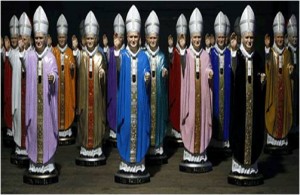 Priests perched themselves in high places, and then pursued power, money and prestige. These men were bishops buttressing their positions and their Church’s coffers. Elders or presbyters were beneath the bishop, deacons or servants below the elders, and the common people were at the bottom of the pile.
Priests perched themselves in high places, and then pursued power, money and prestige. These men were bishops buttressing their positions and their Church’s coffers. Elders or presbyters were beneath the bishop, deacons or servants below the elders, and the common people were at the bottom of the pile.
The people were poorly equipped to detect dishonesty, or to tell the difference between truth and fiction. Bishops had little real respect for them. They regularly referred to the plebs as “rabble” or “fools” or “the multitudes” or the “common crowd,” yet it was the public who put their cash in the collections.
It is sad, wrong and ironic that generations of trusting Christians have wasted their time dissecting the New Testament, expecting to be enlightened, when these characters who created it were so cavalier with the truth. Priests have always insisted that people believe the Bible was divinely inspired. By forcing faith on children and adults too busy to carefully consider it, they have achieved a mastery over human reason. What balderdash!
Times have changed. Biblical writings should not be granted an authority they do not deserve. It is high time bibliolatry and ecclesiology was replaced with open-mindedness, pragmatic thought, and genuine empathy for others. The era in which uninformed people blindly believe dogma and bow down to those promoting it should now be over.
References:
Besant, A. 2009 “The Basis Of Morality”. Theosophical Publishing House. India
Bethune, George “The Grounds of Christianity Examined by Comparing The New Testament with the Old” (http://www.gutenberg.org/cache/epub/15968/pg15968.html)
http://www.infidels.org/library/modern/richard_carrier/NTcanon.html
http://www.orthodox.net/faq/canon.htm
http://www.jesuspuzzle.humanists.net/jhcjp.htm
http://www.jesuspuzzle.humanists.net/postscpt.htm
http://www.cogwriter.com/easter.htm
http://www.drazin.com/chap1.htm
http://allanturner.com/magazine/archives/rm0206/ClergyLaity04.html
http://acurseonalltheirhouses.net/2011/11/11/how-christianity-was-invented/
http://www.jesusneverexisted.com/dark-age.htm
http://www.jesusneverexisted.com/lying.htm
http://www.askwhy.co.uk/christianity/0640ChristianFraud.php
http://godlessgeeks.com/JesusExist.htm
http://www.pbs.org/wgbh/pages/frontline/shows/religion/watch/
http://www.youtube.com/watch?v=pAr18jQcnS0&feature=related
http://thriceholy.net/Texts/Celsus.html


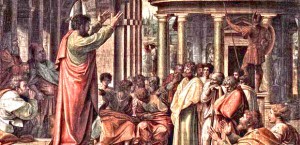

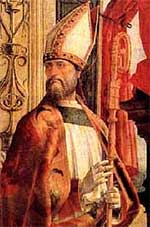
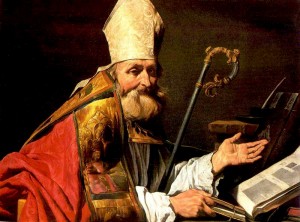
please post more
Where Christianity has spread throughout the world, racism has all too often followed closely behind. Mark Wayne is the author of Jesus is black, get over it.